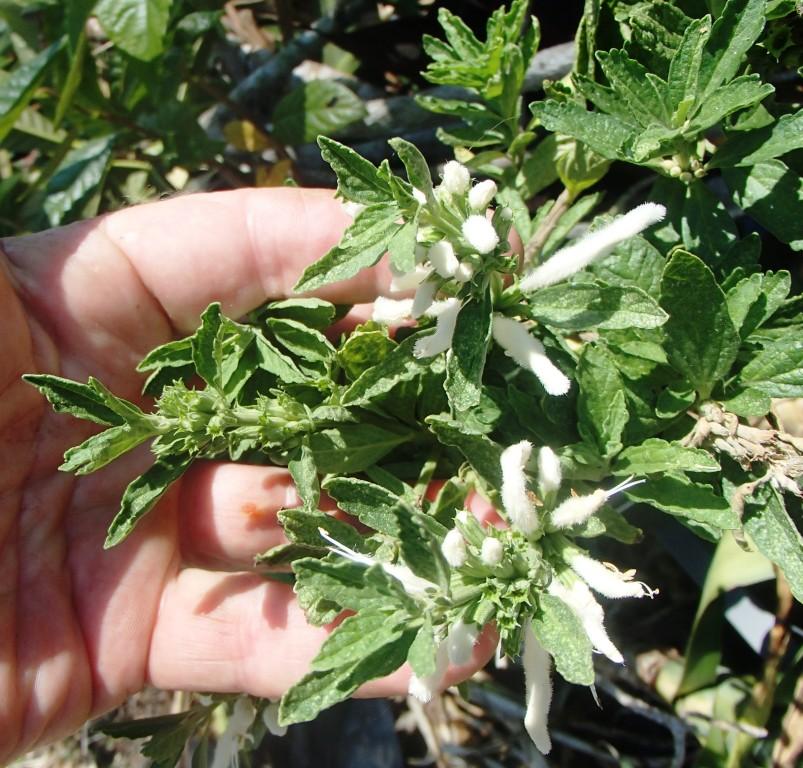LION’S TAIL HERBAL PLANTS Leonotis leonurus RARER WHITE
I have plants & leaves for sale. Prices vary.Want some? JUST ASK

Medicinal Uses
Leonotis leonurus herb has a long history of various medicinal uses by traditional African tribes. It was regularly used for headaches, dysentery,flu, chest infections, epilepsy, constipation, intestinal worms, insect bites, snake bites, menstrual delays and hypertension. Externally Leonotis leonurus was used for haemorrhoids, eczema, skin rashes, boils and other wounds. Benefits have also been found when using this plant for arthritic, painful and inflammatory conditions and controlling hypoglycemic symptoms. The latter has been found to be supported by scientific research.

This herb has a background of being used for its psychoactive properties which have been compared to that of a milder version of the Cannabis plant. The dried leaves and flowers are reknown for creating a mild calming effect. The main active constituent of the Leonotis leonurus is leonurine and in high doses the plant is known to be toxic, affecting bodily organs, blood cells and bodily functions.
Herbal medicine specialists of today mainly use this plant for easing premenstrual discomfort by partaking in a soothing tea infusion..


Growing Conditions
Leonotis leonurus does well with at least 6 hours of sun per day for best results. It is drought resistant once established, but does better from regular watering when on the dry side. Tolerant of most soils, but ensure that the ground is well-drained. This plant is said to be frost tolerant but may shed its leaves in very frost prone areas and re-grow them when the weather becomes warmer.

Generally, the flowering period is in summer, continuing in warm regions through to autumn and even winter in the tropics of Australia. In cooler parts of the world, this plant is grown in glasshouses for its ornamental value. Pruning can benefit Leonotis leonurus to encourage repeat flowering and shape.

Botanical Name: Leonotis leonurus
Lion’s Tail Leonotis leonurus is a medium evergreen plant growing at 1-2 meters tall and approx.50cm to 100cm wide. The dark green leaves are held in opposite positions on the square stem. The leaves are lanceolate, 2-10cm long and quite thin, curving downward and may have spiky edges or toothed margins. The leaves decrease in size from the base to the top.

The leaves are aromatic when crushed. The long tubular flowers may be a bright orange or creamy white. [in this case they are white.] They are grouped in tiered whorls which circumvent the stem, rising up the plant to above the foliage in attractive clusters. The flowers are covered in a thick fine down of hairs which extend over the tip creating a fringed effect. They are highly ornamental and bloom in summer or throughout the year in warm climates.

Leonotis leonurus belongs to the family Lamiaceae and is native to South Africa, where it is quite common. The botanical name ’leonurus’ is derived from Greek and refers to the resemblance to a lion’s tail seen by some people.

A local common name is Dagga flower. In the wild, Lion’s Tail prefers to grow on hillsides and slopes with intermittent wet and dry periods. Some plant listings mistakenly identify this plant as ‘Motherwort’, due to the similar botanical name of Leonurus cardiaca Lion’s Tail is naturalised in some areas of California, Australia & Hawaii.

The white variety is known as ‘Alba’ and the ornamental effect of the white hairs seems to be more pronounced on the white flowers. Beyond this, there seems to be very little difference.

Both orange & white flower varieties are bird attractants in their native environment, having evolved to accommodate the curved beaks of nectarivorous sunbirds.Henry
 Any questions or if buying, contact me HERE
Any questions or if buying, contact me HERE


